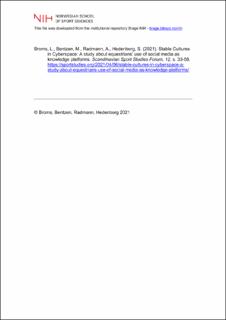Stable Cultures in Cyberspace: A study about equestrians’ use of social media as knowledge platforms
Peer reviewed, Journal article
Published version
Permanent lenke
https://hdl.handle.net/11250/2757663Utgivelsesdato
2021Metadata
Vis full innførselSamlinger
- Artikler / Articles [2096]
- Publikasjoner fra Cristin [1084]
Originalversjon
Scandinavian Sport Studies Forum. 2021, 12, 33-58.Sammendrag
New media habits in the era of digitalization challenge previous understandings of who and what receives media coverage. Research shows that practitioners in self-organized lifestyle sports consistently use social media to attain and exchange information and knowledge about their sport. Is this also the case in organized sport? The Internet has become a great resource for horse-enthusiasts and the online horse world can be described as an extension of the physical horse world. Equestrian sport is particularly interesting to analyze due to the fact that there is an animal involved. Still, there is little knowledge of how horse enthusiasts use social media in relation to their interest in equestrian sports. The aim of this article is therefore to chart and analyze how equestrians use social media, how they communicate horse-related content on social media, and how social media can be seen as a source for knowledge exchange. Our investigation focuses on how equestrians use social media to acquire information about horses, and how this usage can be explained in connection to age and experience. A mixed methods design is used and data is collected from 28 focus group interviews with equestrians in Sweden and Norway and a survey with 1,628 respondents. Our study indicates that practitioners of self-organized sports are not unique in using social network sites (SNS) to exchange and attain knowledge about their sport; equestrians in general are shown to be frequent users of SNS such as Facebook and Instagram. Although our results show a few significant differences in SNS use in relation to age; the riders in the different age groups have surprisingly similar views of their SNS use in relation to attaining information about the horse. ‘Stable cultures’ and the organized structure of equestrian sports appear to create boundaries determining where a ‘good equestrian’ should seek information about horse-keeping. However, the organized structure and traditional nature of this sport do not stop equestrians from turning to SNS.
